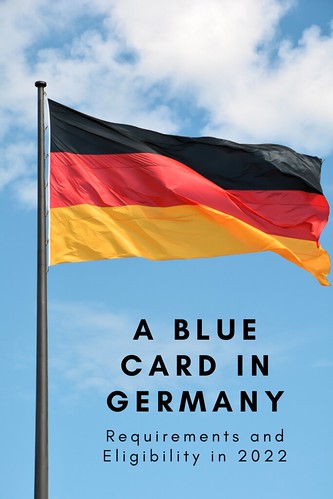A Blue Card in Germany: Requirements and Eligibility in 2022
Germany is home to one of the largest foreign-born labor forces and has an admirable work culture. Many expats find the high standard of living, strong economy, impressive productivity levels, and good job opportunities here appealing. If you’re a newcomer looking to enjoy these benefits, you need to understand the basics of the German Blue Card visa application.
The German EU Blue Card is a special work and resident permit for highly-skilled labor. It gives them the opportunity to work in high-demand fields or professions with future prospects. With a Blue Card in Germany, you can stay for four years, which is extendable on demand if you still meet the requirements after the elapsed duration.
If this looks like something you’d love to apply for, here are some requirements to be aware of.

The German Blue Card Eligibility
The following conditions will affirm your eligibility if you fulfill them:
University Degree
You must have a degree from a German University or from a foreign university that is recognized in Germany. An entirely different degree that could still be compared to a degree in Germany will also suffice.
Qualification Recognition
The competent authorities in your discipline must verify the authenticity of your qualifications. This especially applies to regulated professions such as law, teaching, engineering, and other health service-related jobs.
Employment Offer
You must have a concrete job offer from a German company to qualify for a Blue Card. Your official work contract must indicate your salary and position before it’ll be considered valid.
Freelancers and self-employed individuals are excluded from applying for this permit, as it only works for employees in German companies.
Health Insurance
You must sign up for public health insurance before you get your EU Blue Card in Germany. There is an option available for people who would rather sign up for private health insurance, but that’s dependent on your pay grade.
The EU Blue Card Salary Threshold
Before you can qualify for a German Blue Card, you must have secured a job at a company in Germany willing to pay at least €56,400 per year. For professionals whose expertise is “in shortage” like IT, mathematics, natural sciences, human medicine, and engineering, the minimum salary is reduced to at least €43,992 per year.
For people with a salary lower than €56,400 per year, an approval from the German Federal Employment Agency must be requested, before a Blue Card can be granted to them.
How to Apply for the German Blue Card
Here’s a step-by-step process for applying for the German Blue Card:
Secure a Job
Find a job in Germany with an offer of at least one year. In the work contract, your position, duration of employment, and salary (within the required threshold) must be clearly stated. You can seek job opportunities on online job portals like Euraxess.de, Alumniportal-deutschland.org, and EURES.
Apply for a Visa
After securing a job, the next step is to apply for an employment visa from the German consulate or embassy. They will tell you the required documents to bring and schedule a visa interview with you.
Register your Living Address and Get Health Insurance
Register your living address at the local Resident’s Registration Office (Bürgeramt) and enroll with a health insurance provider. You must do this within 14 days of arrival. Your registration certificate and insurance certificate will be requested when you submit your application for the German Blue Card.
Apply for the EU German Blue Card
Gather the required documents and apply for the German Blue Card at the local Immigration Office (Ausländerbehörde) and wait for approval once the application is complete, which usually ranges from four to six weeks.
-

- Log in to post comments



















